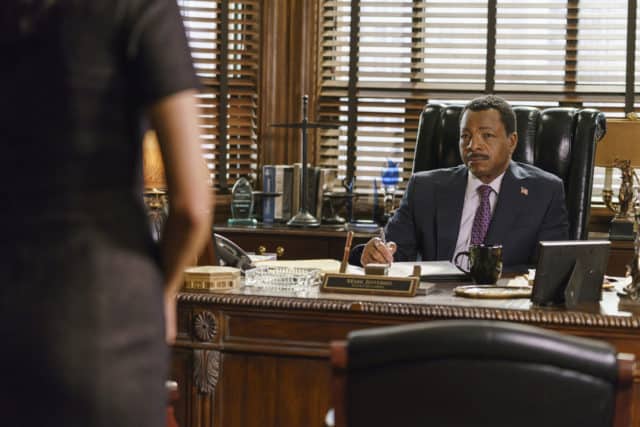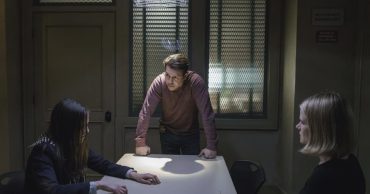
Any case which involves a veteran is always more touchy than most. When there is a clear divide within the office on something like this, it creates a real ethical dilemma. It is the duty of the our armed forces to protect and defend the rights and liberties of American citizens, no matter what the cost and without the expectation of recognition. It is the duty of the Chicago State’s Attorney’s Office to get justice for victims who die in an unnatural and wrong death. Chicago Justice features a case which shows how difficult those conflicting roles are.
An honorably discharged sailor is killed right after his bachelor party. After four tours of duty, Trevor Nichols did not deserve to die a week before his wedding. Normally his death would be chalked up to a robbery gone bad, except for everything hinky about Trevor’s post-Navy life. Peacefully retired men don’t get $400,000 book advances for their memoirs, or have an NSA-level encrypted thumbdrive with footage of a raid gone bad hidden in their stomach. As it turned out, Trevor was carrying a huge amount of guilt for an operation he was apart of which went very wrong. His SEAL team was in charge of rescuing Cathryn Carter, a doctor who worked with Doctors Without Borders captured by the rebels. The official story was that Dr. Carter was killed by the rebels in the midst of the escape, but Trevor’s hidden footage shows otherwise.
Dr. Carter was killed by friendly fire, and it was immediately covered up. That is, until Trevor decided to use the footage to make things right. He was going to write a book exposing what really happened on Operation Omega. His guilt got to him so badly that he gave Dr. Carter’s family a quarter of his advance. They wouldn’t accept the money if they knew it was made on their daughter’s blood, but they had no knowledge of that. Trevor’s fellow SEALs on the mission had a lot to lose from Trevor’s tell-all, so it makes sense that they would have crossed that line to protect their futures and the reputation of the U.S. Navy.
It’s clear that their lawyer doesn’t know his clients’ potential motive, but judging by the invasion of the Department of Justice in Stone’s office, he finds out fairly quickly. Stone is pleasantly surprised that the judge allows the video into evidence against the DOJ’s request. However, Jefferies and Stone don’t see this case the same way. As a veteran, Jefferies isn’t comfortable tarnishing the reputation of a group of men who dedicated their lives to their country. They made a terrible, horrific mistake, and it overshadowed everything else they’d ever done. Not wanting to be disrespectful of Trevor’s father’s wishes, Stone has to make a calculated play. He doesn’t use the video as evidence, but as incentive to turn one defendant against the other. It works, but not so well that Stone doesn’t have to use the truth about Operation Omega to get a conviction. Stone does get a conviction, and that’s about as well as the situation could get under the circumstances. What’s done is done, and more people’s lives were ruined than was imaginable. No conviction, no medals, no higher ideal of justice fixes what’s been broken.
Did Stone make the right call forcing the release of the SEAL operation?
 Follow Us
Follow Us





